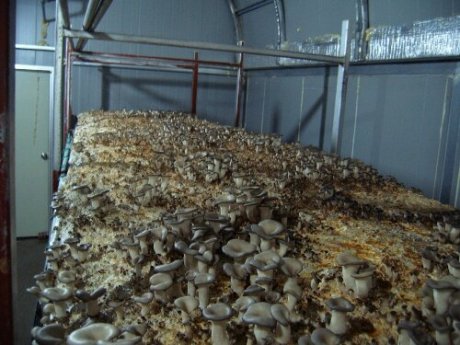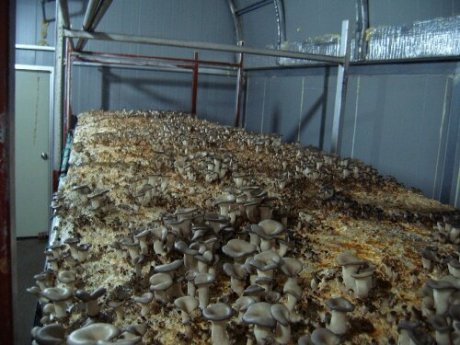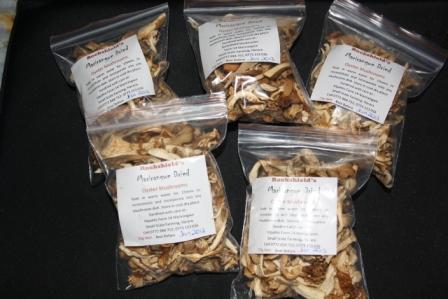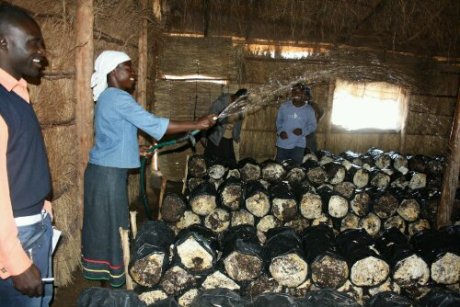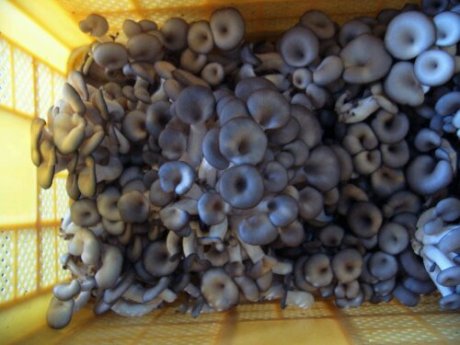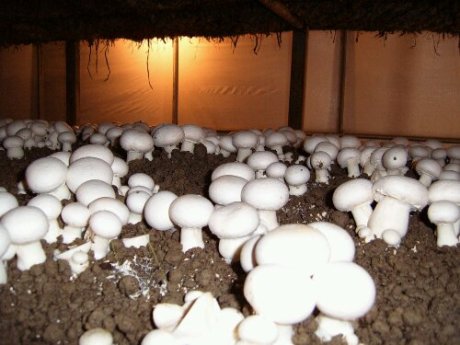Mushroom Cultivation involves the value addition of ordinarily nuisance waste materials into valuable finished products like edible culinary and medicinal mushrooms. Wastes such as plant remains (e.g.maize stover, corncorbs, husks, and bran), industrial by products such as cotton husk, brewers’ grain and sawdusts, water pollutants such water hyacinth and reeds are ordinarily obtained and used. To these spawn is added after pastuerisation, and after incubating for 2-4wks depending with selected materials, mushrooms are harvested.
Spawn which in essence is a culture of a desired mushroom strain plays a crucial role in this activity. In fact spawn inavailability has resulted in the collapse of many mushroom projects in the Third World. It is made by reputable and well equipped laboratories according to set standards to arrive at the level of purity required at the farm as such demands sizeable outlays which in most cases cannot be single handedly afforded. It will be comforting for all our future clients to appreciate that our Associate Organization, Mushtella are a spawn supplier and are willing to assist all our clients with a wide variety of spawn types and strains to suit their needs.
Mushroom Cultivation is an activity that can be done by anyone. The determining qualities on whether an individual can be a successful grower or not are a) initiative b) innovation c) business acumen d) soft skills e) leadership ability. As much as technical knowhow forms the backbone of the enterprise, it is not sufficient to ensure the ability of a start up project to succeed in its operating environment. In short an astute technoprenuer can set up and run a successful mushroom project.
Mushroom Cultivation in Zimbabwe is presently offering great opportunities to entrepreneurs that are willing to take on the start up risks associated with such a lowly subscribed activity. With a sizeable portion of the locally consumed mushrooms being imported chiefly from South Africa and Botswana, local buyers will always be looking for local alternatives that compete well on price and quality. There are as well many types coming into the country that have never before made it onto the country’s retail shelves. These ‘new’ types will always invite ‘first mover premiums’ much lucrative than tobacco or wheat farming. The market is even much fun when one appreciates that the only other strong mushroom producer in the region is South Africa. There are nevertheless sizeable markets for fresh mushrooms in other SADC region nations. With Mozambique for example from far afield as Brazil and Portugal Zimbabwean produce will have a far better competition profile.
The region is generally undergoing a period of peace and economic growth, this entails a growth in the demand for mushrooms as tourism and hospitality continue to boom in growth. As such Zimbabwe being along the North-South trade corridor is even better positioned to tap into the growth than South Africa and this is even true for mushrooms ordinarily accepted and relished by the middle class in most societies.
Mushrooms have always been appreciated for their culinary and medicinal value in the Eastern cuisine. As people become aware of the merits of these approaches to wholesome living in opposition to the old way of treating culinary and medicinal properties of food in separation, more mushrooms will be consumed locally.
In Zimbabwean economic terms, as disposable incomes improve, the middle class is growing and with it the demand for classy dishes such as mushrooms. As such now is the time to start growing mushrooms. We are also ceased as a nation with a need to manage our wastes for a higher quality of life, mushroom cultivation kills two birds with one stone in that is both ecologically and economically affective.
As Kurima Agro we have appreciated the gap between the prospective mushroom grower’s entrepreneurial spark and the actual implementation of the idea. In between the two ends lie the vacuum called ignorance. Many mushroom start-ups are not so much killed by lack of capital as they are by lack of knowledge. This reality is worsened by the fact that those government agencies and institutions responsible with dissemination are either incapacitated, non-responsive or both, or worse still led by poorly equipped university freshmen.
We have a collective experience in the Industry both local and abroad of over 15 years. We have suffered the same frustrations as yourselves in setting our own projects. We know what failure means and we know how worse it feels when you take the step to acquire pre-requisite knowledge but yet still are faced with ignorance based challenges. Kurima itself is buttressed n a thirst for knowledge even better a desire to facilitate the exchange of knowledge between peoples from different specialties. This is because we believe Zimbabwe’s economy is agro-based and that its growth can be catalysed through the cross pollination of minds- entrepreneurial minds.
As Kurima Agro we will not proffer a one size fits approach to knowledge. We will offer our clientele with courses presently in Mushroom Cultivation, immediately, in Oyster Mushrooms, a type we strongly consider a springboard. In the succeeding courses we will offer other mushroom types. Most immediately Shiitake, but we do hope to train in as many mushroom types as Zimbabweans would want to profitably partake in and healthily relish.
Our method of training will remain practical as we seek to impart the knowledge we have. In this manner we will be holding short 1 day duration courses. As part and parcel will be growing manuals for sale and free issue. We will make sure to include as much short videos content as possible and as well practical sessions during which each participant will be able to grasp and test the knowledge acquired in a practical setting.
Why don’t you join us for our first course entitled
Waste to Taste to Cash
@The Institute Of Agriculture Engineering Hatcliffe
1 Scam Way Hatcliffe
From 9am till 4pm
Cost USD40/head before date and USD50/head on the date
On Thursday 2 August 2012
training date. Payments can be done via Eco-Cash. Call Masimba on 0772888752 or Dzikamai 0733816895 for more details.
by Masimba B. Mpahlo (Rockshield mushrooms)
